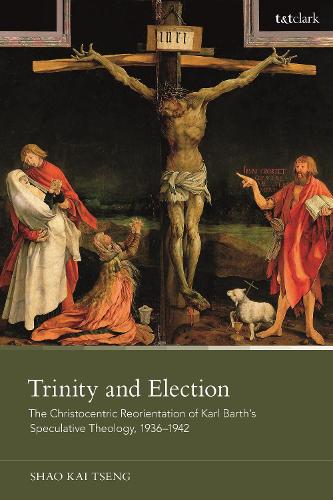
Trinity and Election: The Christocentric Reorientation of Karl Barths Speculative Theology, 1936-1942
(Paperback)
Available Formats
Publishing Details
Trinity and Election: The Christocentric Reorientation of Karl Barths Speculative Theology, 1936-1942
By (Author) Dr. Shao Kai Tseng
Bloomsbury Publishing PLC
T.& T.Clark Ltd
22nd August 2024
United Kingdom
Classifications
Tertiary Education
Non Fiction
230.044092
Physical Properties
Paperback
280
Width 154mm, Height 232mm, Spine 16mm
440g
Description
Challenging Bruce McCormacks paradigm of post-Kantian Barth scholarship, this book builds on the interpretative model that Sigurd Baark developed in 2018. This model interprets Barths innovative adoption of an Anselmian mode of theological speculation, against the intellectual-historical background of the idealist tradition of speculative metaphysics that culminated in Hegel. This book argues that Barth adopted the Anselmian mode of speculation in which immediate self-identity between subject, object, and act is found in the triune God alone, while the speculative identity that enables human knowledge of God is none other than the identity between God-in-and-for-Godself and God-for-us. Exploring the nationalistic dimension of speculative metaphysics in 19th-century Germany, Tseng identifies this as an important aspect of the context of Barths development of a Christocentric form of speculative theology.
Reviews
In this compelling work, Shao Kai Tseng offers a careful, detailed, sophisticated and convincing alternative to both ahistorical and historicized readings of Karl Barth with practical implications regarding social and political matters. By carefully considering the Anselmian and Hegelian moments in Barths theology, this important book moves Barth studies beyond the problems embedded in McCormacks view of Barths actualism. Anyone interested in Barths theology today will surely want to read this book. * Paul D. Molnar, St. John's University, USA *
Tseng's illuminating analysis of Barth's Christological concentration in the 1930s confirms the far-reaching theological fruitfulness of in-depth studies of Barth's theological development. It is on the precise determination of election and Trinity that the clarity of Barth's chosen path is decided. At the same time, the political implications that Tseng finally brings into focus show that his emphasis on the speculative character of Barth's thought is by no means in complete contradiction to a critical rationalism that Barth is attested by others. * Michael Weinrich, Ruhr-Universitt Bochum, Germany *
Over against the neo-Kantian paradigm that has drawn so much attention these last decades, Tseng offers us a fascinating new reading of the intellectual impetus of Barths mature theology. There may be (too) many books about Barth; but this is one any serious Barth scholar will have to reckon with. * Edwin Chr. van Driel, Pittsburgh Theological Seminary, USA *
Author Bio
Shao Kai Tseng is ZJU100 Research Professor in the School of Philosophy, Zhejiang University, China
